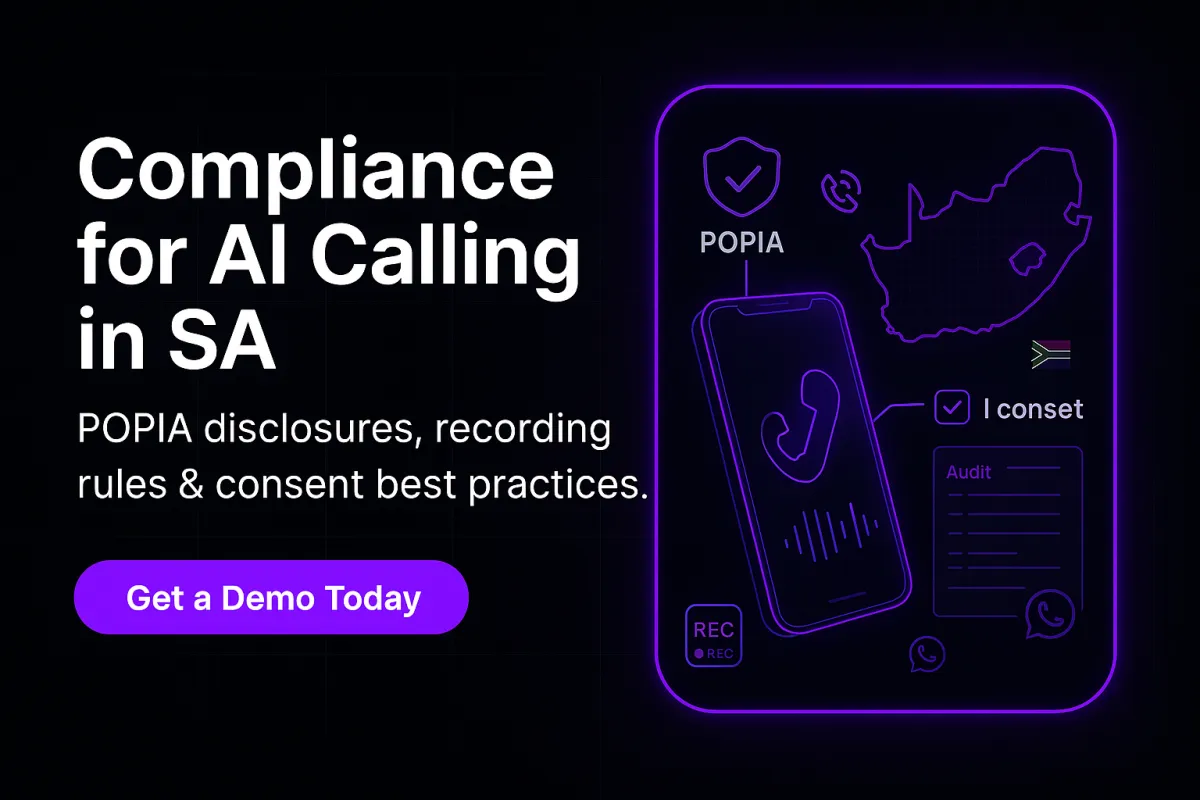
Compliance for AI Calling in SA
Compliance for AI Calling in SA
POPIA disclosures, recording rules, and consent best practices.
This article is informational, not legal advice. For edge cases, consult a qualified attorney.
1) Consent to contact (POPIA §69) — when you may call
POPIA restricts direct marketing by “electronic communication,” which explicitly includes automatic calling machines (i.e., AI callers). You may only place marketing calls if the data subject has opted in, or if they’re an existing customer and you provide a clear opt-out in every message. You’re allowed one approach to request consent from non-customers, and you must honour any refusal immediately. POPIA+2inforegulator.org.za+2
How we implement it
Capture consent at lead source (forms, WhatsApp, checkout) with purpose wording and a one-tap opt-out.
Store consent timestamps + source in InOne CRM; display status to agents.
Use AI Callers for opted-in leads; for first-time prospects, trigger the one-time consent request only.
Mirror the same preferences across WhatsApp using templated, utility-first copy (see FAQ) and WhatsApp solutions.
2) Fair processing notices (POPIA §18) — say what you’ll do
Before or at the point of collection, tell people what you’ll do with their data: who you are, why you’re calling, what will be stored, and their right to object. The Information Regulator’s regulations emphasise notifying the right to object and making notices reasonably accessible (including via WhatsApp). POPIA+1
Voice script starter (steal this):
“Hi, this is your AI Receptionist from [Brand]. We’re calling to [purpose, e.g., confirm your service booking]. We’ll store this call result in your account so our team can assist. You can say ‘stop’ at any time to opt out.”
Link voice to chat so the notice is visible in writing too—our AI Receptionist drops a WhatsApp recap automatically and logs it to InOne CRM.
3) Call recording rules (RICA) — record lawfully, prove it later
Under RICA, any person may record a communication if at least one party to the call has given prior consent in writing. In practice, businesses typically disclose recording and capture verbal consent at the start of the call, then store the recording + consent event in their system. (If you’re not a party to the call, different restrictions apply.) Government of South Africa+1
Operational guardrails
Play a brief recording disclosure at the top of AI-initiated calls and capture a simple “yes”.
If the caller refuses, continue without recording or switch to WhatsApp for written steps.
Retain recordings only for defined periods; tag them to the contact in InOne CRM with purpose and retention end-date.
4) “Special” data & biometrics — handle with extra care
POPIA treats biometric information (including voiceprints) as Special Personal Information, which has stricter processing conditions and often requires additional authorisation. If you intend to use voice for speaker verification, treat that as special-data processing and document your lawful basis (or avoid voice biometrics altogether). Government of South Africa+1
5) Evidence that survives audits — your trail in one place
A clean trail beats a long argument. Your InOne CRM record for every AI call should include:
Consent status + timestamp/source (form, WhatsApp, phone)
POPIA §18 notice text/version presented
Recording consent outcome and RICA flag
Templates sent (IDs), opt-outs, and channel (WhatsApp vs voice)
Call summary, transcript snippet, and disposition (booked, qualified, opted-out)
Interesting AI note: small speech-understanding models can detect objection/opt-out phrases (“stop”, “no more calls”) in near-real time; we use this to auto-pause a number and write an audit event within milliseconds.
6) Practical do’s & don’ts (South Africa)
Do
Use opt-in first for outbound marketing; rely on the one-time approach sparingly. POPIA
Keep notices short and human; follow with a written recap in WhatsApp via WhatsApp Website Integration when leads start on your site.
Centralise logs, consents, and recordings in InOne CRM.
Don’t
Guess on low confidence—ask one clarifier or route to a human (fail-safe).
Store recordings forever; define and apply retention.
Use voiceprints unless you truly need them and have the lawful basis.
Quick compliance checklist
Consent captured and synced across channels (web, WhatsApp, voice)
§18 notice delivered (voice + written)
Recording disclosure + consent outcome logged (RICA)
Opt-out one-tap in every message/template
Retention policy applied to recordings and transcripts
Full audit trail visible to admins
Implement this without the DIY pain
Explore AI Callers (SA-ready voice + audit trails): https://aiautomatedsolutions.co.za/ai-callers
24/7 AI Receptionist for inbound + routing by region: https://aiautomatedsolutions.co.za/ai-receptionist
Orchestrate consent, logs, SLAs in InOne CRM: https://aiautomatedsolutions.co.za/inone-crm
Policy basics & templates: https://aiautomatedsolutions.co.za/faq
WhatsApp capture + site launcher: https://aiautomatedsolutions.co.za/whatsapp-website
WhatsApp solutions hub: https://aiautomatedsolutions.co.za/whatsapp
Visit: https://aiautomatedsolutions.co.za/
Contact us: https://aiautomatedsolutions.co.za/contact-us
Sources: POPIA §69 direct marketing and the Information Regulator’s guidance; POPIA §18 notification and 2025 regulations; RICA Section 5 on interception with consent; POPIA definition and guidance on special personal information (biometrics).


